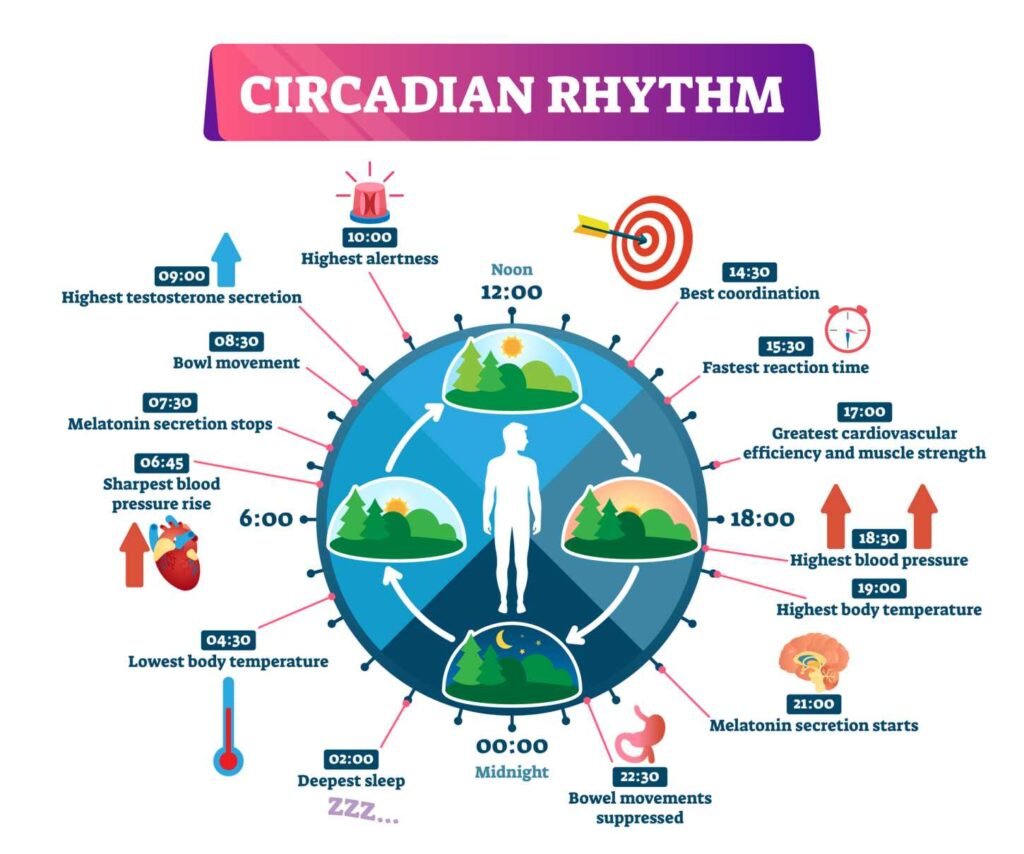The Circadian Rhythm is a natural, internal process that regulates the sleep-wake cycle of living organisms. This internal biological clock is present in almost all living organisms, including humans, animals, and plants. The circadian rhythm is responsible for regulating various physiological processes, including hormone production, metabolism, and body temperature. It is also responsible for regulating the sleep-wake cycle, which is essential for maintaining overall health and well-being.
The circadian rhythm is regulated by a group of cells in the brain called the suprachiasmatic nucleus (SCN). The SCN receives input from the eyes, which helps to synchronize the internal biological clock with the external environment. This synchronization is important for maintaining a healthy sleep-wake cycle. Disruptions to the circadian rhythm can lead to various health problems, including sleep disorders, metabolic disorders, and mental health issues. Understanding the circadian rhythm and how it works is essential for maintaining good health and well-being.

Understanding Circadian Rhythms
Circadian rhythms are physical, mental, and behavioral changes that follow a roughly 24-hour cycle, responding primarily to light and darkness in an organism’s environment. These rhythms are driven by an internal biological clock, which is known as the circadian clock or the biological clock.
Biological Clock and Circadian Clock
The biological clock is a complex system that regulates various physiological processes in the body, such as sleep, hormone production, and body temperature. The circadian clock is a specific type of biological clock that regulates the organism’s daily rhythms. It is present in almost all living organisms, including humans, animals, and plants.
Role of the Suprachiasmatic Nucleus
The suprachiasmatic nucleus (SCN) is a small group of cells located in the hypothalamus region of the brain that serves as the primary circadian pacemaker in mammals. The SCN receives information about the light-dark cycle from the eyes and synchronizes the circadian clock with the external environment. It then sends signals to other parts of the brain and the body to regulate various physiological processes.
Genes and Proteins in Circadian Rhythms
The circadian clock is regulated by a complex network of genes and proteins that interact with each other to generate the daily rhythms. These genes are known as clock genes, and the proteins they produce are called clock proteins. The clock genes and proteins work together in a feedback loop, with the proteins regulating the expression of the genes, and the genes regulating the production of the proteins.
Research has shown that disruptions to the circadian rhythm, such as those caused by shift work or jet lag, can have negative effects on health, including increased risk of obesity, diabetes, and cardiovascular disease. Therefore, understanding the mechanisms behind circadian rhythms is essential for maintaining good health.
In conclusion, circadian rhythms are a crucial aspect of an organism’s physiology, and their regulation is essential for maintaining good health. The biological clock and the circadian clock work together to generate these rhythms, and the SCN plays a critical role in synchronizing the clock with the external environment. The complex network of clock genes and proteins regulates the circadian rhythm, and disruptions to this network can have negative effects on health.
Influences on Circadian Rhythms
Circadian rhythms are regulated by a master clock located in the suprachiasmatic nucleus (SCN) of the hypothalamus in the brain. The SCN receives input from various environmental cues, which help synchronize the body’s internal clock with the external environment. Here are some of the key factors that influence circadian rhythms:
Light and Dark Cycles
Light and dark cycles are the most important environmental cue that affects circadian rhythms. Light exposure during the day signals the SCN to suppress the production of melatonin, a hormone that promotes sleep. In contrast, darkness at night stimulates the production of melatonin, promoting sleepiness and helping to reset the circadian clock.
Environmental Cues and Zeitgebers
Environmental cues, also known as zeitgebers, are external factors that help synchronize the body’s internal clock with the external environment. Examples of zeitgebers include mealtimes, social interactions, and physical activity. These cues can help reset the circadian clock and improve the timing of sleep and wakefulness.
Temperature and Metabolism
Temperature and metabolism also play a role in regulating circadian rhythms. Body temperature follows a circadian pattern, with the lowest temperature occurring during sleep and the highest temperature occurring during wakefulness. This temperature rhythm is thought to help regulate the timing of sleep and wakefulness. Additionally, metabolism is also regulated by circadian rhythms, with certain metabolic processes occurring at different times of the day.
Overall, circadian rhythms are influenced by a variety of factors, including light and dark cycles, environmental cues, temperature, and metabolism. By understanding these influences, individuals can take steps to improve the timing of their sleep and wakefulness, leading to better overall health and well-being.
Circadian Rhythms and Sleep
Circadian rhythms play a crucial role in regulating the sleep-wake cycle, which is the natural 24-hour cycle of wakefulness and sleep. Melatonin, a hormone produced by the pineal gland in the brain, helps regulate the sleep-wake cycle by inducing drowsiness at night.
Sleep-Wake Cycle and Melatonin
The sleep-wake cycle is regulated by the circadian rhythm, which is influenced by light exposure and other external factors. Melatonin production is triggered by darkness and suppressed by light, which is why exposure to bright light in the evening can disrupt sleep patterns.
Melatonin supplements* are sometimes used to treat sleep disorders such as insomnia, jet lag, and advanced sleep phase syndrome. However, the effectiveness of melatonin supplements in treating sleep disorders is still a matter of debate among experts.
*As an Amazon.com Affiliate, we may earn a small commission if you buy from a link within this page.
Circadian Rhythm Disorders
Circadian rhythm disorders are conditions that disrupt the normal sleep-wake cycle. The most common circadian rhythm disorders are advanced sleep phase syndrome, delayed sleep phase syndrome, and irregular sleep-wake disorder.
Advanced sleep phase syndrome is characterized by a shift in the sleep-wake cycle, resulting in early sleep onset and early morning awakening. Delayed sleep phase syndrome, on the other hand, is characterized by a shift in the sleep-wake cycle, resulting in a delay in sleep onset and difficulty waking up in the morning. Irregular sleep-wake disorder is a condition in which the sleep-wake cycle is fragmented, resulting in multiple sleep periods throughout the day and night.
Impact of Age on Sleep Patterns
Age can have a significant impact on sleep patterns. As people age, they tend to experience changes in their circadian rhythm, resulting in changes in sleep patterns. Older adults may experience difficulty falling asleep, waking up frequently during the night, and waking up early in the morning.
In conclusion, circadian rhythms play a crucial role in regulating the sleep-wake cycle. Disruptions to the circadian rhythm can result in sleep disorders such as insomnia, jet lag, and circadian rhythm disorders. Age can also have a significant impact on sleep patterns, resulting in changes to the circadian rhythm.
Effects of Circadian Disruption
Circadian disruption can have significant consequences on human health. The following subsections will explore some of the effects of circadian disruption in more detail.
Shift Work and Irregular Schedules
Shift work and irregular schedules can disrupt the body’s natural circadian rhythm, leading to a range of negative health effects. Shift workers often work during the night, which is the rest phase for humans, and are at particular risk of circadian rhythm and sleep disruption. This disruption can lead to fatigue, stress, and a range of health disorders, such as gastrointestinal issues.
Travel and Jet Lag
Travel across time zones can disrupt the body’s natural circadian rhythm, leading to jet lag. Jet lag can cause a range of symptoms, including fatigue, difficulty sleeping, and gastrointestinal issues. The severity of jet lag depends on the number of time zones crossed and the direction of travel.
Health Conditions Linked to Rhythm Disruption
Circadian disruption has been linked to a range of health conditions, including obesity, diabetes, depression, and cardiovascular disease. Disruption of the circadian rhythm can lead to stress, which can cause an increase in cortisol levels. Elevated cortisol levels have been linked to an increased risk of obesity, diabetes, and cardiovascular disease. Additionally, circadian disruption has been linked to an increased risk of depression.
In conclusion, circadian disruption can have significant consequences on human health. Shift work, irregular schedules, travel, and jet lag can all disrupt the body’s natural circadian rhythm, leading to a range of negative health effects. Additionally, circadian disruption has been linked to a range of health conditions, including obesity, diabetes, depression, and cardiovascular disease.
Optimizing Circadian Health
Circadian rhythm is a vital component of overall health, and optimizing it can lead to better sleep, improved mood, and increased energy levels. There are several ways to optimize circadian health, including establishing a consistent routine, managing diet, exercise, and light exposure, and addressing circadian rhythm disorders.
Establishing a Consistent Routine
Establishing a consistent routine is one of the most important steps in optimizing circadian health. This includes waking up and going to bed at the same time each day, even on weekends. It is also important to avoid napping during the day, as this can disrupt the natural sleep-wake cycle. Additionally, individuals should avoid using electronic devices before bed, as the blue light emitted by these devices can interfere with the production of melatonin, a hormone that helps regulate sleep.
Diet, Exercise, and Light Exposure
Diet, exercise, and light exposure can also play a role in optimizing circadian health. Individuals should aim to eat a balanced diet that includes plenty of fruits, vegetables, and whole grains, and avoid consuming caffeine and alcohol close to bedtime. Regular exercise can also help regulate the sleep-wake cycle, but it is important to avoid exercising close to bedtime, as this can interfere with sleep.
Exposure to bright light during the day can also help regulate circadian rhythm. Individuals should aim to spend time outside during the day, especially in the morning, as this can help reset the body’s internal clock. Additionally, individuals should avoid exposure to bright light at night, as this can disrupt the production of melatonin.
Managing Circadian Rhythm Disorders
In some cases, individuals may experience circadian rhythm disorders, which can disrupt the natural sleep-wake cycle. Delayed sleep phase syndrome, for example, can cause individuals to go to bed and wake up later than normal. Treatment for circadian rhythm disorders may include light therapy, which involves exposure to bright light at specific times of the day, or melatonin supplements, which can help regulate the sleep-wake cycle.
Overall, optimizing circadian health is an important component of overall health and well-being. By establishing a consistent routine, managing diet, exercise, and light exposure, and addressing circadian rhythm disorders when necessary, individuals can improve their sleep, mood, and energy levels.
Frequently Asked Questions
How can circadian rhythms become disrupted?
Circadian rhythms can become disrupted due to a variety of factors, including changes in work schedules, jet lag, exposure to artificial light at night, and certain medical conditions. Shift workers, for example, often experience disrupted circadian rhythms due to their irregular work schedules. Disruptions to the circadian rhythm can lead to a variety of health problems, including sleep disorders, mood disorders, and metabolic disorders.
What are some common examples of circadian rhythms in everyday life?
Circadian rhythms play a role in many aspects of everyday life, including sleep-wake cycles, hormone production, and metabolism. For example, most people naturally feel sleepy at night and alert during the day, which is due to the circadian rhythm. Other examples of circadian rhythms include the daily fluctuations in body temperature, blood pressure, and heart rate.
Which area of the brain regulates the circadian rhythm?
The suprachiasmatic nucleus (SCN) in the hypothalamus is the area of the brain that regulates the circadian rhythm. The SCN receives input from the eyes, which allows it to synchronize the body’s internal clock with the external environment. The SCN then sends signals to other areas of the brain and body to regulate various physiological processes.
How do circadian rhythms function in plant life?
Circadian rhythms also play an important role in plant life. In plants, circadian rhythms regulate many aspects of growth and development, including the opening and closing of stomata, the production of chlorophyll, and the timing of flowering. Like in animals, the circadian rhythms in plants are regulated by internal biological clocks that are influenced by external cues such as light and temperature.
What methods are effective for resetting one’s circadian rhythm?
There are several effective methods for resetting one’s circadian rhythm, including exposure to bright light in the morning, avoiding exposure to bright light at night, and maintaining a regular sleep schedule. In some cases, medications or supplements may also be used to help reset the circadian rhythm.
What are the health implications of an irregular circadian rhythm?
An irregular circadian rhythm can have a variety of negative health implications, including sleep disorders, mood disorders, and metabolic disorders. Disruptions to the circadian rhythm have been linked to an increased risk of obesity, diabetes, cardiovascular disease, and certain types of cancer. Maintaining a regular sleep schedule and avoiding disruptions to the circadian rhythm is important for overall health and well-being.
Advanced Sleep Phase Syndrome: Symptoms and Treatment Options

Advanced Sleep Phase Disorder (ASPD) is characterized by a shift in the timing of the sleep period, resulting in an early sleep onset and an early morning awakening.
Continue reading: Advanced Sleep Phase Syndrome
Delayed Sleep Phase Syndrome: Causes, Symptoms, and Treatment

Delayed Sleep Phase Syndrome (DSPS) is a type of Circadian Rhythm Sleep Disorder that affects the internal clock of an individual. In DSPS, an individual’s internal clock is delayed, which makes them fall asleep and wake up later than the average person.
Continue reading: Delayed Sleep Phase Syndrome
Irregular Sleep-Wake Disorder: Symptoms, Causes, and Treatment

Irregular Sleep-Wake Rhythm Disorder (ISWRD) is a rare sleep disorder that is characterized by a disrupted sleep pattern. People with ISWRD experience fragmented sleep throughout the day and night, with no clear distinction between sleep and wakefulness. This results in a lack of quality sleep, which can cause significant impairment in daily functioning.
Continue reading: Irregular Sleep-Wake Disorder





